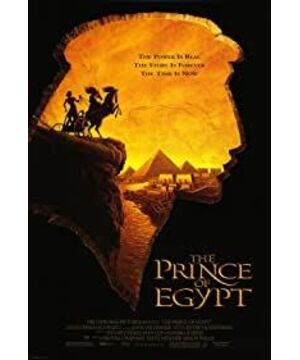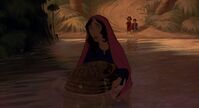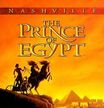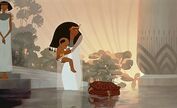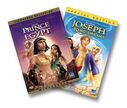Ah, please don’t say I’m corrupt. If you Baidu "Moses Ramses" and look at the items on the first page, you will know that this is Human nature...
"Prince(s) of Egypt" was a typical example of praise but not popular. Now it seems that this evaluation is quite pertinent. The slave chants in the opening chapter are magnificent, coupled with a pious and touching attitude of painting, to vividly show the Egyptian style of civilization and fruit under the management of Ramses II to the audience. Whether it is the huge stone sculptures of the slaves who stare at the ant colony at their feet, the peacock-tailed clusters of sedges on the banks of the Nile, or the exquisite murals with strong exotic customs, they are all impressive. The production team must have done enough homework to portray Egypt so vividly. What is commendable is that such a production attitude has been carried out from the beginning to the end of the film, and it can always give people a new visual experience during the entire viewing process. The music is also very coordinated, and the themes of several paragraphs are very clear, and they appropriately set off the atmosphere. Although there is still room for improvement in music performance, it is better to achieve this step. It is natural to be so willing to pay for the blood, and it is natural to applaud, and the producer must be a believer in the Lord!
The painting is impeccable and the music is appropriate, but another element of the film and television works, the plot, is not so powerful compared to the excellent performance of the above two. "Prince(s) of Egypt" is derived from the "Exodus" in the "Bible · Old Testament". It is about the prophet Moses accepting the will of the gods and leading the Hebrews to get rid of the slavery of the Egyptians and go to the legend " "The Promised Land of Honey and Milk" Canaan's Story. Because many of the contents of the "Old Testament" are recognized by Christianity, Judaism and Islam at the same time, although it is a religious story, it cleverly avoids possible disputes. It is not difficult to see that the main line of this story is really thin, and there are only a handful of characters arranged. The whole film is supported by the love and hatred of the righteous brothers Moses and Ramses. It is no wonder that the main audience of European and American theater animation in 1998 was still children, and the fast-food of the plot was inevitable. However, in front of children, the exquisite Egyptian style is probably not as good as the African grasslands where demons dance. The love and killing of the two brothers with beard and bald is not as good as Peng Pengding's cute bickering. The story of "Prince(s) of Egypt" is too simple for adults and too boring for children. I'm afraid this is the reason why it is not popular. (It should be quite interesting for the rotten girl, but that was 98 years when the rotten house had not yet awakened...) In terms of
characters, the characters who appeared on the stage were pitiful. Even so, the portrayal of the main characters is still lackluster. . As the protagonist of the film, Moses’ character change is too abrupt. Yesterday he was a dude, and today he suffered from Secondary Two Disease and was inexplicably depressed. Tomorrow he will become a good man with responsibility and responsibility sitting on a park bench (Huh) . The key turning point occurred when Moses (who had trouble with Ramses) left, met Midian and his group in the desert, and joined Midian's daughter (who came in while he was vacant), and finally accepted the divine decree. Although it seems that the process is long enough and enough to pave the way, the establishment of Moses's sense of responsibility after the awakening of conscience is still not in place-probably because I personally don't like this kind of "father-in-law changes destiny, sisters make life". It's just the subject. (Hey what am I talking about...)
Compared with Moses, the fake prince, the portrayal of the genuine prince Ramses is much more in place. I like this character very much. He was given too many responsibilities since he was a child, and he was always said to be the "weakest link in the Pharaoh's blood chain." ?), Moses has returned, but he has become the most familiar stranger (Huh?!), Moses personally returned the wedding ring of the year (Huh?!!!), Moses steals under his nose (Greek) Borai) people (Ehhhhhhhhhhhhhhhhhhhhhhhhhhhhhhhhhhhhhhhhhhhhhhhhhhhhhhhhhhhhhhhhhhhhhhhhhhhhhhhhhhhhhhhhhhhhhhhhhhhhhhhhhhhhhhhhhhhhhhhhhhhhhhhhhhhhhhhhhhhhhhhhhhhhhhhhhhhhhhhhhhhhhhhhhhhhh! Therefore, although Ramses plays the role of villain in the film, he is a tragic figure who can empathize and sympathize with others.
Oh, by the way, there is another key figure, the God of the Hebrews, Jihohua. Whenever I think of him, in addition to the handsome "Holy Grace Attacks the Elder of a City in the Night" (Huh?) drama, it is the blushing heartbeat "Hold this stick, you are my person". ! (Huh?!) God stick, God stick, that's what it meant!
Speaking of the scene of Ji Hehua's counterattack, I thought of something else. If God's survival and power depend on the number and piety of believers, then the struggle between God and God is equivalent to the struggle for believers. What Gehovah did in this film was to send envoys, spread his faith, and increase his power in Egypt until he was able to open the portal to launch the Holy Grace Night Attack and complete the exodus of the Hebrews. Dig the corners of the native Egyptian gods and seize the believers. Ji Hehua was very bloodthirsty in the film, and he did not reduce the fierceness of destroying the world with floods in the past, which is quite inconsistent with his current saying that "God loves the world". Maybe he hadn't obtained world-wide dominance at that time, and he was at the stage of "the revolution has not yet succeeded, and the comrades need to work hard."
No matter where the people are, the yearning for faith is always accompanied by the pursuit of beauty, such as temples in Greece, frescoes in Egypt, and churches in Rome. Because people believe that their beliefs are beautiful, they also create beautiful things to decorate it. Even in China, there are also the amorous customs of the four major grottoes of Dunhuang and Longmen. Although I don't think religion is a good carrier for faith, I have to admit that in the face of the facts, in the past millennium, among all faiths, religion has the widest applicability to this day. Who said that today we no longer need idols? We have been doing things like hand-made idols for the past few decades, but with unconscious ignorance and blindness, we have lost our pursuit of beauty.
...So, if you want to create an idol, can you choose a slightly more beautiful...In the transparent coffin, it would be nice to put Snow White!
View more about The Prince of Egypt reviews


